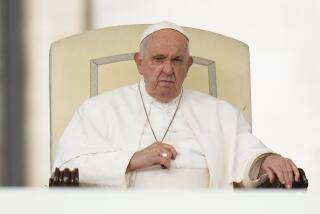Leader of Orthodox Church to Retire : Ecumenism: Archbishop Geron Iakovos, 84, a leader in ecumenical movement, will step down next summer after 36 years. His departure is called the end of an era for the Greek church in America.
- Share via
Archbishop Geron Iakovos, a catalyst for ecumenism among the world’s Christian religions and the spiritual leader of 2.5 million Greek Orthodox believers in North and South America, will step down next summer after a storied 36-year career.
Iakovos’ resignation--attributed to advancing age and deteriorating health--will take effect on his 85th birthday, on July 29, according to a terse announcement made this week by the Ecumenical Patriarchate of the Greek Orthodox Church, based in Istanbul, Turkey.
The former president of the World Council of Churches, Iakovos has long been considered among the deans of religious leaders in the United States.
“He has been a leader, a light,” said Father Basil Kissal of the St. Constantine and Helen Greek Orthodox Church in Washington. “He’s given almost four decades of his life to serve this archdiocese; he’s given it a lifetime of direction and love.”
Iakovos has also been credited with working for Christian unity throughout his career. In 1959, he became the first Greek Orthodox emissary in more than 400 years to meet with a Roman Catholic Pope, John XXIII.
While Iakovos’ resignation has long been rumored in the Orthodox community, the timing and circumstances of the announcement caught the U.S. Greek Orthodox community by surprise.
“All I know is what is in the statement,” said the Rev. Nicholas Triantafilou, chancellor of the Archdiocese of North and South America and second-in-command of the American church under Iakovos. A church official said the archbishop is expected to meet with reporters when he returns to the United States from Greece next week.
The statement announcing his retirement made no mention of the selection of his successor. Generally, archbishops are elected by a vote of the Holy Synod of the Ecumenical Patriarchate, following consultation with the synod of bishops of the Archdiocese of North and South America and the archdiocesan council.
Born on the island of Imbros, Turkey, Iakovos was ordained a priest in Lowell, Mass., in 1940. A graduate of Harvard Divinity School, he has headed the Greek Orthodox Archdiocese of North and South America--an offshoot of the Turkish-based Greek Orthodox Church--since 1959.
From archdiocesan headquarters in New York, he has been a pillar of the worldwide ecumenical movement, serving nine years as a co-president of the World Council of Churches. Iakovos has been an outspoken foe of segregation in the United States, marching with the Rev. Martin Luther King Jr. in Selma, Ala. President Jimmy Carter awarded Iakovos the Presidential Medal of Freedom in 1980. Regarded as a friend of American Jewry, he voiced support for Soviet Jews and sought to influence many Arab Christians in the quest for peace in the Middle East.
Working with other religious leaders, he helped raise private money to build an inter-religious chapel at the Camp David presidential retreat.
Despite his broad popularity in ecumenical circles, Iakovos nonetheless has been at odds in recent years with other leaders of the Greek Orthodox Church over the direction of the U.S. branch, which is made up largely of middle-class Greek Americans who have been assimilated into the nation’s social fabric.
In January, Ecumenical Patriarch Bartholomew, Orthodox Christianity’s worldwide spiritual leader and top administrator, criticized a plan, developed largely by Iakovos, to unify the Greek Orthodox Church and nine other U.S. Orthodox branches, including those with ethnic ties to Russia, Albania, Bulgaria and other Middle Eastern and European nations. Bartholomew ordered Iakovos to scrap the plan.
Orthodox and non-Orthodox leaders said the resignation marks the end of an era for the Greek church in America.
“This is a watershed event in the Greek community,” said George Savidis, editor of The AHEPAN, a Washington-based English-language monthly magazine serving the Greek community.
“Iakovos was such a powerful character,” he said. “He was the hearth and center of our community--not only for the church. No one who grew up Greek was unaware of Iakovos. . . . He has served as a cultural bridge between the old world and the new.”
In that role, Iakovos has sought to maintain Greek Orthodox traditions, such as opposing the ordination of women, while being a prophetic voice on moral issues such as race relations.
Iakovos also has been one of the most vigorous supporters of the ecumenical movement, while resisting attempts to water down traditional theological beliefs.
In 1991, he led a defection of Orthodox churches from the National Council of Churches, a New York-based organization made up of 32 mainline Protestant and Orthodox denominations. The defecting churches complained that the NCC was too liberal on issues such as female ordination, homosexuality, abortion and some theological matters.
After six months of study, the Orthodox churches rejoined the NCC, which later announced a $10-million endowment campaign, named after Iakovos, designed to raise money for ecumenical purposes.
Iakovos also has been instrumental in setting up dialogues involving Orthodox churches and Roman Catholics, Anglicans, Lutherans, Southern Baptists and African American denominations.
“Word of Archbishop Iakovos’ impending resignation fills me with a deep sense of sadness,” said the Rev. Joan Brown Campbell, general secretary of the National Council of Churches and a longtime colleague of Iakovos in church-unity efforts.
Iakovos, she said, “has ministered to our nation, the world and all our churches with joy as well as spiritual commitment and courage.”
More to Read
Sign up for Essential California
The most important California stories and recommendations in your inbox every morning.
You may occasionally receive promotional content from the Los Angeles Times.













